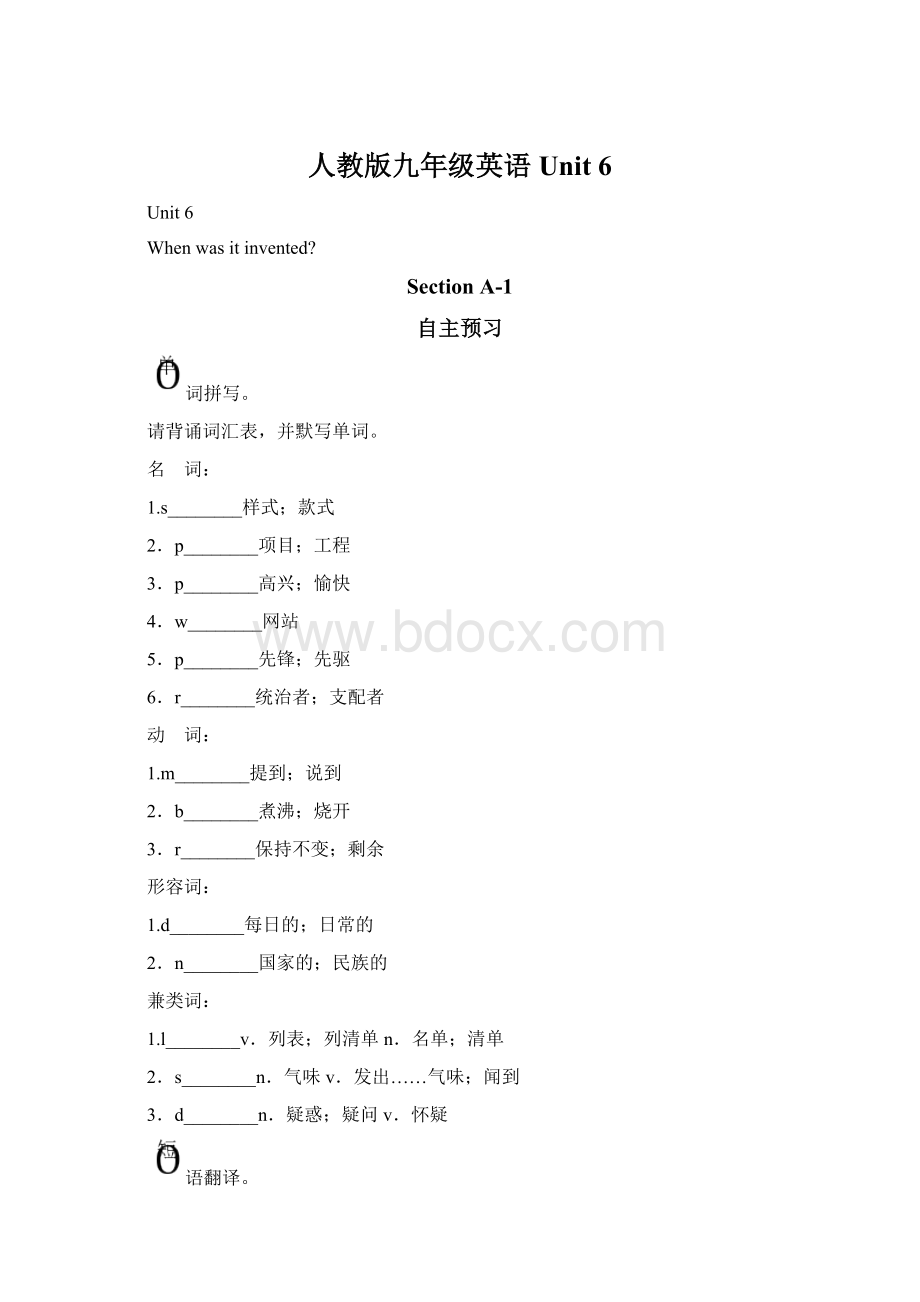人教版九年级英语Unit 6.docx
《人教版九年级英语Unit 6.docx》由会员分享,可在线阅读,更多相关《人教版九年级英语Unit 6.docx(13页珍藏版)》请在冰豆网上搜索。

人教版九年级英语Unit6
Unit6
Whenwasitinvented?
SectionA-1
自主预习
词拼写。
请背诵词汇表,并默写单词。
名 词:
1.s________样式;款式
2.p________项目;工程
3.p________高兴;愉快
4.w________网站
5.p________先锋;先驱
6.r________统治者;支配者
动 词:
1.m________提到;说到
2.b________煮沸;烧开
3.r________保持不变;剩余
形容词:
1.d________每日的;日常的
2.n________国家的;民族的
兼类词:
1.l________v.列表;列清单n.名单;清单
2.s________n.气味v.发出……气味;闻到
3.d________n.疑惑;疑问v.怀疑
语翻译。
请浏览教材,找出以下短语,并背诵之。
1.shoes________specialheels带特殊鞋跟的鞋
2.beused________被用来……
3.________thattime在那时
4.________accident偶然;意外地
5.fall________掉进
6.less________不到;少于
7.take________发生;出现
8.________doubt毫无疑问;的确
成句子。
请仔细阅读教材,补充完整下列句子。
1.ItissaidthataChineserulercalledShenNong________________________________discoverteaasadrink.据说有一位叫做神农的中国统治者最早发现了茶可以饮用。
2.Itisbelievedthattea________________toKoreaandJapanduringthe6thand7thcenturies.人们认为,茶在六至七世纪传到了韩国和日本。
3.TheteatradefromChinatoWesterncountries________________inthe19thcentury.中国与西方国家间的茶贸易发生在十九世纪。
名师导学
单 词
1.pleasure
点拨 pleasure是名词,意为“高兴;愉快”。
其动词形式为please,形容词形式为pleased,pleasant。
常用短语有:
withpleasure愉快地;高兴地;好的;可以;非常乐意
(It's)apleasure./(It's)mypleasure.愿为你效劳;这是件愉快的事;不用谢
拓展
(1)please可做动词,意为“使喜欢;使高兴;使满意;讨人喜欢;令人高兴”;也可做副词,表示“请”。
如:
Whathesaidpleasedus.他的话让我们高兴起来。
(2)pleased意为“高兴的;喜欢的”,指感到“高兴、满意、喜欢”,强调被修饰名词自身的感觉。
其常见结构为:
bepleased+不定式或从句,bepleasedwith,bepleasedat/about。
如:
I'mverypleasedtohearthegoodnews.听到这个好消息我非常高兴。
(3)pleasing意为“令人高兴的;令人满意的”,指某物或某人“使他人高兴、招人喜爱”,强调被修饰的名词给人的感觉。
如:
Theseflowersareverypleasing.这些花招人喜爱。
(4)pleasant意为“令人愉快的;舒畅的;非常好的;讨人喜欢的;风趣的”,与pleasing相似。
如:
Hetalkedinapleasantway.他用一种风趣的方式交谈。
运用 单项填空。
(1)Thetwofriendswerevery________toseeeachother.
A.pleaseB.pleasedC.pleasureD.pleasing
(2)—Thankyouforcomingtoseeme.
—It'sa________.
A.pleaseB.pleasedC.pleasureD.pleasant
2.nearly
点拨 nearly为副词,意为“几乎;将近;差不多”
辨析 nearly与almost
(1)表示“接近;就要到了”时常用nearly;表示“不足;尚差一点儿”时常用almost。
(2)almost相当于verynearly,多表示时间、程度、距离、进度,可修饰morethan,too及nothing,never等否定词,nearly则不行。
如:
Almostnoonecallsher.几乎没人给她打电话。
(3)nearly表示“接近”时,可与almost换用,但在具体数字前常用nearly;被very,not,pretty修饰时,应用nearly而不用almost;notnearly表示“一点也不;决不;远非”。
运用 单项填空。
Iknowpretty________allthesecretsofhismarriedlife.
A.nearlyB.almostC.hardlyD.mostly
短 语
3.beusedfor
点拨 beusedfor是动词短语,意为“被用作……”,后跟名词、代词或动名词,相当于短语beusedtodosth.,是一个表示被动含义的短语。
如:
Thismachineisusedforwashingclothes.=Thismachineisusedtowashclothes.这机器是用来洗衣服的。
拓展 beusedas被当作……来使用
beusedby被……使用
beusedtodoingsth.习惯于做某事
usedtodosth.过去常常做某事
运用 完成句子,每空一词。
(1)钢笔是用来写字的。
Thepenis________________writing.
(2)拖拉机是供农民们使用的。
Tractorsare________________thefarmers.
4.takeplace
点拨 takeplace是动词短语,意为“发生;进行;举行;开展”。
takeplace为比较正式的用语,一般指非偶然性事件的“发生”,即这种事件的发生一定有某种原因或事先的安排。
辨析 takeplace与happen
takeplace多指经过安排而“发生”的事情;happen表示“偶然地发生”,常用结构为“sth.happenstosb.”;二者的主语均是物。
如:
Theopeningoftheplaywilltakeplacetomorrownight.戏剧的首演式将于明晚举行。
Idon'tknowhowthishappened.我不知道这事是怎么发生的。
运用 单项填空。
Thefestival________inJulyeachyear.
A.happenedB.happensC.tookplaceD.takesplace
每课一练
一、根据句意及汉语提示完成单词。
1.The________(国家的)DayisonOctober1stofayear.
2.Theclothesarethenewest________(样式)thisyear.
3.Itismy________(高兴)tomakeahouse.
4.Thecompanyproducesthefoodwithout________(疑问).
5.Itisa________(清单)ofthethingstobuy.
二、句型转换,每空一词。
1.Whendidpeopleinventthebus?
(改为被动语态)
When________thebus________?
2.It'susedtocutthings.(同义句转换)
It's________________cuttingthings.
3.Thezipperwasinventedin__1893.(就画线部分提问)
________________thezipper________?
4.Hehappenedtosmellityesterdayinthehospital.(同义句转换)
Hesmelledit________________yesterdayinthehospital.
5.SomeonesaysthataChineserulercalledShenNongfirstdiscoveredteaasadrink.(同义句转换)
________________thataChineserulercalledShenNongfirstdiscoveredteaasadrink.
三、单项填空。
( )1.Theknifeisused________cutting.
A.forB.asC.byD./
( )2.—I'mvery________withmyowncooking.Itlooksniceandsmellsdelicious.
—Hmm,itdoeshavea________smell.
A.pleasant;pleasedB.pleased;pleased
C.pleasant;pleasantD.pleased;pleasant
( )3.Heisanhonestboy.Ihavenoreasonto________whathesaid.
A.hearB.doubtC.repeatD.believe
( )4.TheOlympicGamesof2016will________inBrazil.
A.takeafterB.takeoffC.takeplaceD.takeaway
( )5.Thetelephone________bythewell�knownscientist,AlexanderGrahamBell.
A.inventedB.inventingC.wasinventedD.invent
( )6.—Thankyoufortakingmearoundyourschool,Daming.
—________
A.Don'tmentionitB.Nevermind.C.OfcoursenotD.Noproblem.
( )7.—Thanksforthedeliciousfood.
—________
A.No,thanks.B.That'srightC.Allright.D.Mypleasure.
( )8.Momiscookingdinner.It________sonice.
A.smellsB.tastesC.feelsD.sounds
( )9.Ifyouwanttog